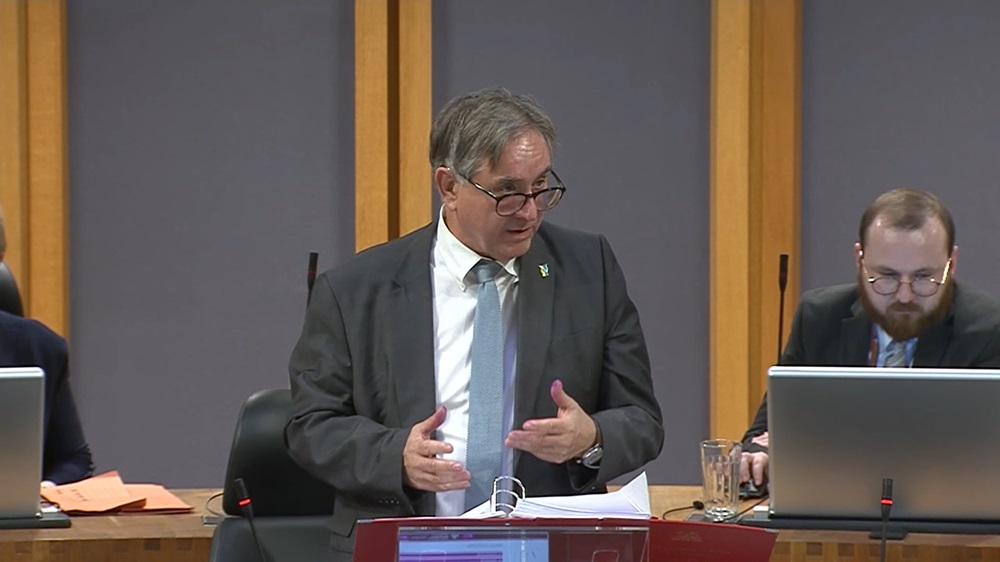Assisted dying law ‘will be big test for devolution settlement’

Martin Shipton
The assisted dying law will provide the first test of whether the UK Labour government is prepared to respect the Senedd’s right to have its own view on a major piece of social legislation, according to former Counsel General Mick Antoniw.
The proposed law – known officially as The Terminally Ill Adults (End of Life) Bill – is due to have its Third Reading in the House of Commons on April 25.
If passed, it would make it possible for people with a terminal illness to be helped to end their own lives lawfully, so long as strict safeguards were followed.
It is intended that the new law would apply in both England and Wales.
Sewell Convention
However, according to a parliamentary procedure known as the Sewell Convention, it’s argued that because the issue touches on the devolved area of health, the Senedd should have the final say on whether it is implemented in Wales.
Mr Antoniw, the Labour MS for Pontypridd, said: “Under the Sewell Convention, the Senedd would be expected to pass a Legislative Consent Motion (LCM), allowing Westminster to legislate for Wales as well as England.
“If Sewell is operated as it was intended to, the Senedd could, if it wishes, block the law from being applied in Wales.
“But there were occasions when the last Tory government was in power at Westminster when it simply ignored the wishes of the Senedd and overrode the refusal to pass the LCM, imposing the law on Wales anyway.
“As yet we can’t be sure what would happen if the Senedd rejected the Bill, despite the fact that it had been passed at Westminster.
“The UK Government could accept the Senedd’s decision, it could reject it outright, or it might decide that while the health element of the Bill relates to a devolved policy area and is within the Senedd’s competence, the criminal penalties are beyond the Senedd’s remit.
“It’s a test for how devolution works when Labour is in power in both Westminster and Wales.
“Beyond that, there is of course a powerful argument that Sewell shouldn’t just be a convention, but should itself be enshrined in law as part of a more powerful devolution settlement. That’s what I would like to see happen.”
Non-binding vote
In October 2024, in a non-binding vote at the Senedd, a majority of MSs who voted were opposed to an assisted dying law. Those voting no included First Minister Eluned Morgan and Health Secretary Jeremy Miles, with Mr Miles warning of “huge ramifications” for Wales if the law changed.
In total, 19 Senedd Members voted in favour of the motion, with 26 against and nine abstentions.
The debate which preceded the vote included emotive contributions from both sides.
Conservative MS James Evans said his grandad had wanted his grandmother to “have the option to end her life naturally” after a stroke left her with “no life or quality of life”.
But doctors told his grandfather he could be prosecuted and he regretted the decision to extend his wife’s life “for the rest of his days”.
Mr Evans said he entered politics because of a promise he made to his grandmother that he would “never let anybody go through what she went through at the end of her life”.
Rhys ab Owen, an Independent MS, talked about his father, Owen John Thomas, himself a former Plaid Cymru Assembly Member who he said in his final years “wasn’t able to speak, he couldn’t go to the toilet”.
He added: “They were cruel to us as a family, and there are no words to describe how cruel the experience was for him.
“Who are we? Who am I to force any person to live through that experience if they don’t wish to do so.
“I wouldn’t want any individual or family to have to suffer through that experience.”
“Yet again, on the other hand, even in those final weeks, his smile was still there, and that meant the world to us.”
Raising questions about how the law would work, Mr ab Owen asked: “I’ve lost a number of people in that very special hospice, Home Towers. Will that hospice, which is such a beautiful location, be asked to become a setting to assisted dying – palliative care in one room, assisted dying in another?”
He said he supported the legislation, but said he had “major concerns”.
Plaid Cymru South Wales East MS Delyth Jewell was among those opposed to assisted dying.
‘Terror’
Close to tears, she said: “My fear with this motion, my terror is not so much with how it will begin but how it will end.”
She said safeguards in countries like Canada, the Netherlands and Belgium had been gradually eroded.
“For many disabled people or people who are not close to their family, people who are worried, anxious and lonely it would leave them feeling they have no choice but to end their life.”
North Wales Conservative MS Sam Rowlands said passing such a law would be a “slippery slope”, using the example of Canada where he said from 2027 “people with mental illness … will be offered this as a way out of their situation.
“It’s a very, very real situation in other places all around the world, and I fear that that would be exactly the same in this country.”
Impact assessment
A Welsh Government spokesperson told Nation.Cymru: “We are in regular contact with the UK Government to monitor the Bill’s progress and work on an impact assessment has begun to plan for any implications for Wales.
“In the meantime, we are working with the NHS in Wales to provide high-quality end-of-life care to people and support to their families.”
Support our Nation today
For the price of a cup of coffee a month you can help us create an independent, not-for-profit, national news service for the people of Wales, by the people of Wales.




